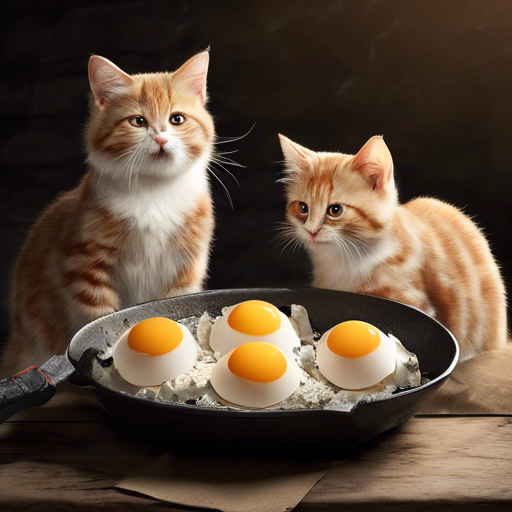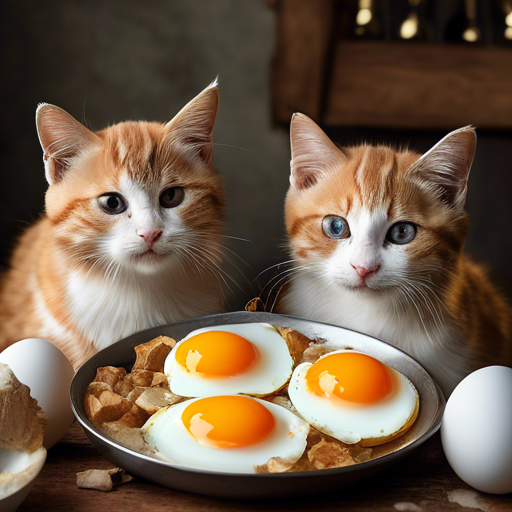As cat owners, we often ponder if our feline friends can partake in human foods. A frequent inquiry is ‘can cats eat eggs?’ The answer is affirmative; cats can have eggs, specifically cooked ones, as a component of a balanced diet. Nevertheless, it is crucial to grasp the do’s and don’ts of offering eggs to cats to safeguard their health.
Nutritional Benefits of Eggs for Cats
Eggs are brimming with essential nutrients that are beneficial for cats, making them a superb protein source for feline health. This high-quality protein aids in tissue repair, bolsters the immune system, and nurtures a healthy skin and coat. Additionally, eggs provide vitamins for cats, including vitamin D, iron, and biotin—collectively known as eggs vitamins—which are pivotal for various bodily functions.
Moreover, eggs supply cats with vital amino acids, such as taurine for cats, indispensable for their vision, digestion, and cardiac function, enhancing their overall well-being. The healthy fats in eggs, including omega 3 for cats, are advantageous for their brain health, nervous system, and cardiovascular health.

Safe Ways to Feed Eggs to Cats
When offering eggs to your cat, it is crucial to follow some guidelines to ensure their safety and well-being. Here are some important points to keep in mind:
1. Cook the Eggs Thoroughly
Always cook the eggs thoroughly before feeding them to your cat to prevent the risk of foodborne illnesses. Whether you scramble, hard-boil, or microwave the eggs, ensure they are fully cooked to avoid salmonella contamination. It’s important to note that cats should not eat raw eggs. On the other hand, can cats eat scrambled eggs? Yes, as long as they are prepared without harmful additives.
2. Remove Seasonings and Additives
Refrain from adding any seasonings, salt, butter, oil, cheese, or milk to the eggs when preparing them for your cat. These additives can be high in calories or even toxic for cats. It is best to serve plain, unseasoned eggs, whether they are cooked, boiled, or hard-boiled, to your feline companion.
3. Portion Control
While eggs can be a nutritious supplement to your cat’s diet, they should not replace their regular cat food. Consider eggs as an occasional treat or a dietary addition, rather than a staple meal, to ensure a balanced cat diet that fulfills all of your cat’s nutritional needs.
4. Consult with Your Veterinarian
Before introducing eggs or any new food to your cat’s diet, it is always wise to consult with your veterinarian for cat health guidance. They can provide personalized advice based on your cat’s specific health condition and dietary requirements.
Potential Risks and Considerations
While eggs can be beneficial for cats, it is important to be aware of potential risks such as food allergies in cats and other considerations:
1. Allergies and Individual Reactions
Just like humans, cats can have allergies or individual sensitivities to certain foods, including eggs. When cats eat eggs for the first time, start with a small amount and observe their reaction. Look for signs of digestive upset or itching, which may indicate an allergic reaction to the cat egg.
2. High-Fat Content
Egg yolks are high in fat, so if your cat needs weight management or has a specific dietary requirement, it may be best to limit or avoid feeding them egg yolks. Stick to egg whites, which are lower in fat and calories, to see if can cats eat egg yolk without issues.
3. Complete and Balanced Diet
While eggs are a source of complete protein and animal protein, they should not be the sole source of nutrition for your cat. Cats require a complete and balanced diet that meets all of their nutritional needs, which can be found in commercial cat food recipes formulated by veterinary nutritionists.
Conclusion
In conclusion, cats can safely enjoy cooked eggs as part of their diet. Eggs provide essential nutrients such as protein, vitamins, and minerals that contribute to their overall well-being, making egg a good option for cats. However, it is important to follow proper preparation methods, portion control, and consult with your veterinarian to ensure your cat’s specific dietary needs are met. By incorporating eggs into their diet responsibly, you can offer your furry friend a tasty and nutritious treat.







1 thought on “Can Cats Eat Cooked Eggs?”